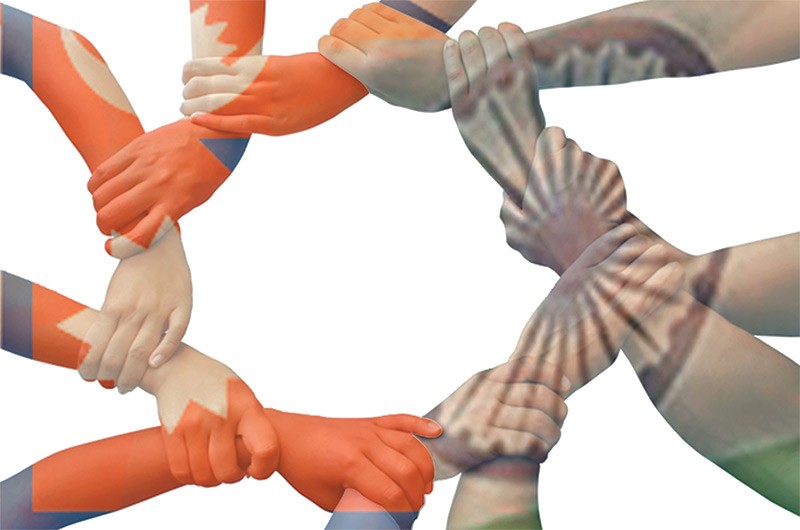The Bahá’í teachings offer profound insights into the transition from dependence to interdependence, fostering a worldview where individuals recognize their intrinsic connection to one another. This transformative journey mirrors the interwoven fibers of a tapestry, each strand representing unique identities while collectively manifesting a grand design. As humanity stands on the precipice of universal integration, the principles extolled by this faith illuminate pathways to a more harmonious existence.
At the outset, it is essential to delineate the concept of dependence—a state commonly rooted in the perception of limitations, isolation, and a false sense of self-sufficiency. In this paradigm, individuals often view their needs as isolated whims, relying on external entities for sustenance, security, and affirmation. This can lead to an ego-centric worldview, wherein existence revolves around personal gain rather than communal welfare. Consequently, the lessons of the Bahá’í teachings proffer a radical redefinition of this paradigm—transitioning towards a framework of interdependence, characterized by reciprocity, collaboration, and mutual elevation.
The metaphor of a vast ocean illustrates the salience of interdependence. Each drop of water, while distinct, contributes to the expanse of the sea, sustaining countless ecosystems in an intricate balance. In this analogy, humanity can be perceived as distinct drops, where interdependence signifies an acknowledgment of our shared currents. This oceanic connectivity fosters the understanding that the flourishing of one drop invariably nurtures the collective milieu. Thus, Bahá’í teachings advocate for a holistic perspective, emphasizing that the well-being of one is inextricably linked to the well-being of all.
At the core of this transition are fundamental Bahá’í principles that serve as guiding stars on this shared voyage. One of the foundational tenets is the oneness of humanity, which posits that regardless of race, creed, or culture, all individuals share a common origin. This tenet serves as a potent counterbalance to divisions fostered by materialistic ideologies and social stratifications. When embraced, the oneness principle cultivates spheres of inclusivity and unity, laying the groundwork for collaborative efforts in various social domains.
The transformative power of education is pivotal in fostering interdependence. Education, within the Bahá’í context, transcends mere academic pursuits; it encompasses moral and ethical training as well. This broad conception of education equips individuals with the tools necessary to dismantle prejudices and cultivate empathy. In turn, this empathetic understanding fosters a culture of interconnectedness, wherein individuals not only seek personal advancement but also the upliftment of others. Thus, the ripple effect of well-nurtured minds is instrumental in fostering a formidable societal fabric.
Moreover, the concept of service emerges as another critical beacon in the Bahá’í doctrine, illuminating the pathway toward interdependence. Service, defined as selfless action undertaken to enhance the well-being of others, underscores the essence of human relationships. By actively engaging in the betterment of one’s community, individuals cultivate a sense of belonging and responsibility. This elevation of communal welfare above individual interests catalyzes a deeper sense of connection among peers, forming a nexus of supportive relationships that bolster resiliency in the face of adversity.
The journey toward interdependence also necessitates the cultivation of attitudes that transcend self-interest. Through the lens of altruism, the Bahá’í teachings articulate that true fulfillment arises not from material accumulation but from serving others and contributing to the collective progress of humanity. In this light, wealth is redefined—not merely as financial assets, but as the richness of relationships and shared experiences that bind individuals together in the intricate web of life.
In recognizing the symbiotic nature of all human endeavors, Bahá’ís assert that systematic efforts must be initiated to address global challenges collaboratively. The crises facing the modern world—be they environmental degradation, social inequity, or political strife—demand collective action. Herein lies the appeal of interdependence as a viable solution; the complexities of these dilemmas require pooling of resources, ideas, and efforts across borders and cultures. This notion asserts that the fortitude needed to navigate such challenges effectively can only be realized through cooperative strategies born of a profound understanding of our interconnected realities.
Furthermore, Bahá’í teachings emphasize the importance of dialogue as a tool for building bridges across divides. In an era defined by polarized opinions and contentious dialogs, engaging in constructive conversations cultivates a culture of respect and understanding. This dialogical approach engenders a fertile ground for innovative solutions that spring forth from diverse perspectives. Each voice contributes a valuable thread to the tapestry of collective insight, reinforcing the notion that true wisdom emerges when disparate viewpoints converge towards a shared goal.
As we contemplate the manifold pathways from dependence to interdependence, it becomes evident that such a transition is neither instantaneous nor effortless. It is a lifelong journey that unfolds through intentional actions, steadfast commitment, and unwavering faith in one another’s potential for growth. The Bahá’í teachings are an invaluable compass, guiding humanity towards a connected world rooted in love, unity, and profound understanding.
Ultimately, the vision of interdependence extends beyond mere coexistence; it proposes a transformative paradigm wherein individuals actively collaborate to manifest a just and peaceful society. In doing so, the Bahá’í worldview not only celebrates diversity but catalyzes a global movement towards interconnectedness that resonates with the deepest aspirations of the human soul. It is through this unified effort that we ascend from the shores of dependence into the boundless ocean of interdependence—nurturing a connected world where each individual’s light illuminates the path for others, ultimately leading to a collective illumination of humanity.
